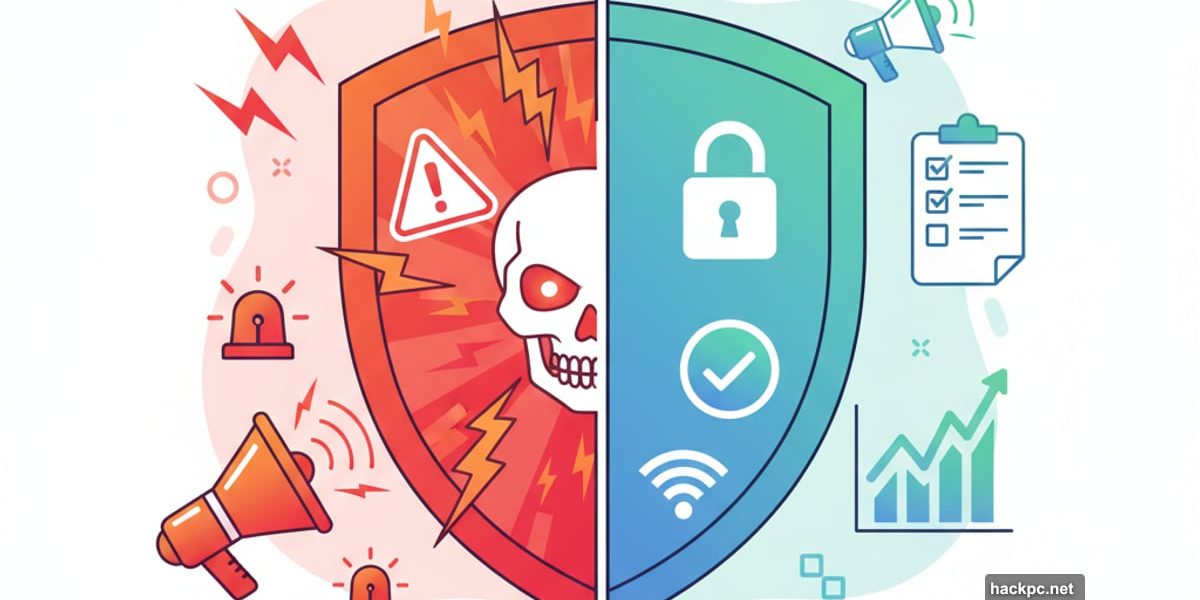
VPN ads are everywhere now. You can’t scroll YouTube or start a podcast without hearing how hackers are lurking, ready to steal your data.
The pitch sounds urgent. The solution sounds simple. But most of it is exaggerated nonsense designed to make you anxious enough to buy.
VPNs can be useful tools. I use one daily. But the way some companies sell them borders on dishonest. Let’s cut through the fear-mongering and figure out what VPNs actually do.
What a VPN Actually Does
A virtual private network encrypts web traffic between your device and a remote server. It hides your public IP address from your internet provider and network administrators.
That’s useful in specific scenarios. Public Wi-Fi becomes safer. Your ISP can’t log which sites you visit. You might access region-locked content.
But that’s mostly where it ends. A VPN doesn’t make you anonymous. It won’t stop phishing or malware. It just hides where you’re connecting from, not who you are once you log in.
Plus, websites you sign into still know your identity. Your VPN protects your connection, not your accounts or passwords.
Fear Sells Better Than Facts
VPN marketing exploded because panic works. The more afraid you feel, the better the pitch sounds.
Influencers earn money by telling audiences the internet is dangerous. Then they point to a sponsor that claims to fix everything. Simple formula, effective results.
Researchers at the University of Maryland studied these ads. They found VPN marketing doesn’t educate people about privacy. Instead, it makes them more anxious about being watched or hacked.
So if an ad tries to scare you before explaining anything useful, that’s a sales tactic. Not security advice.
Military-Grade Encryption Sounds Impressive
When a VPN claims “military-grade encryption,” it usually means AES-256 or ChaCha20. Both are strong, well-established standards that banks and messaging apps use.
But here’s the thing. Almost every legitimate VPN uses the same encryption. It’s not unique or special.
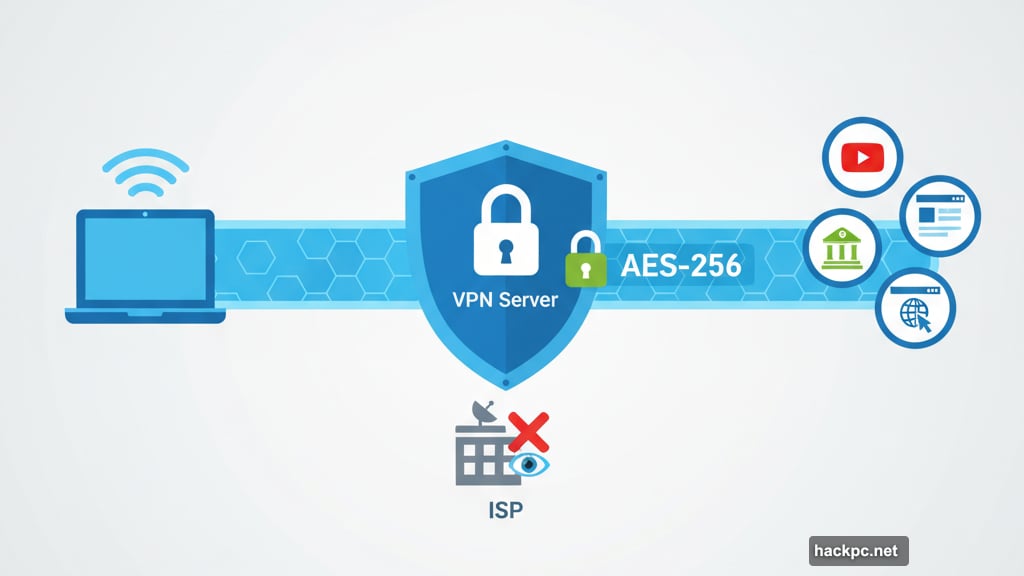
The phrase sticks because it sounds powerful. It implies spy-level secrecy. In reality, encryption is table stakes for any decent VPN provider.
So if that’s the first thing a company brags about, they’re probably trying to sound more advanced than they really are. Look for additional privacy features instead, like kill switches and verified no-logs policies.
Complete Anonymity Is a Myth
Some ads promise you can browse without leaving a trace. That’s not how VPNs work.
A VPN hides your IP address from your ISP and websites you visit. But it doesn’t erase your identity. Any site you log into still knows who you are because you signed in with your credentials.
If you use your real accounts, your identity is already exposed. The VPN just masks your location, not your presence.
Claims of “complete anonymity” usually appear when companies lean on surveillance fears. It sounds reassuring. It’s rarely accurate.
VPNs Don’t Protect Passwords or Credit Cards
Many ads suggest that turning on a VPN makes your private information completely safe. Not true.
A VPN can protect you on public Wi-Fi from network administrators seeing your traffic. It might mitigate certain attacks, like adversary-in-the-middle situations.
That’s useful. But it’s not comprehensive cybersecurity protection.
A VPN doesn’t stop phishing. It won’t prevent password reuse problems. It can’t protect you from data breaches at companies you trust.
So if you enter your login on a fake site, or if a company leaks your information, the VPN has nothing to do with it. VPNs are good for privacy in specific situations, not security mistakes.
Data Collection Doesn’t Magically Stop
Ads claim VPNs stop companies from collecting your data. That’s misleading.
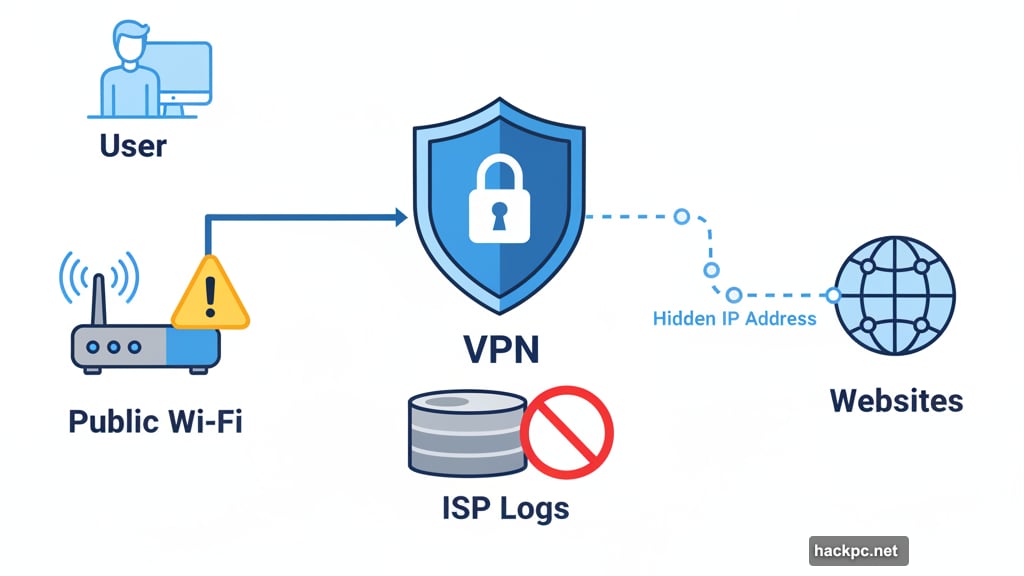
A VPN hides your traffic from your internet provider and network administrators. But companies like Google and Meta still collect data through your accounts, trackers and cookies.
If you’re signed into an account, these companies still know who you are and what you do. A VPN doesn’t erase data collection. It only shifts who can see it.
Your ISP can’t watch your traffic anymore. But your VPN provider can. That’s why you should only use services that have been audited and maintain verified no-logs policies.
The privacy you gain depends entirely on whether you trust your VPN provider not to snoop.
One-Click Security Is a Dangerous Lie
Security isn’t a single step. It depends on using strong passwords, keeping software updated, running antivirus programs, enabling multifactor authentication and staying aware of threats.
A VPN provides privacy protection. But that’s only one piece of your cybersecurity approach.
When a company says its VPN is all you need for security, it’s being dishonest. VPNs are privacy tools, not security apps. They don’t cover everything that puts you at risk online.
Streaming Access Comes With Caveats
Some VPN ads promise you can watch anything from anywhere. This is partly true.
A VPN can make it appear you’re connecting from another location. That sometimes lets you reach content that’s blocked in your region.
But streaming services actively block VPNs. Plus, servers that work today might stop working tomorrow. It’s a constant cat-and-mouse game.
If you want a VPN for streaming, look for companies with large international server networks. That gives you more options when one server fails.
And avoid providers that promise full access to specific platforms. Those guarantees are rarely accurate and usually short-lived.
Pricing Is Deliberately Confusing
VPN pricing feels like navigating a maze. Most providers offer monthly, annual and multiyear plans. Generally, you save the most with longer commitments.
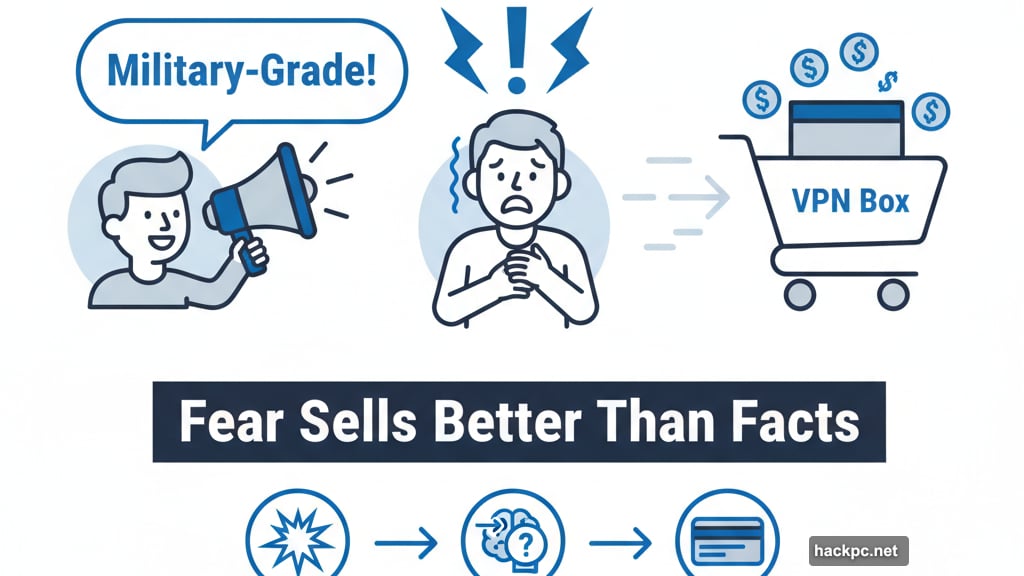
But we don’t recommend signing up for more than one year at a time. Your initially fast VPN could suffer slow speeds or get acquired by a shady parent company.
Here’s how the pricing tricks work. Next to annual and two-year plans, you’ll see a massively inflated price crossed out. That’s usually the monthly plan multiplied by 12 or 24 months.
Next to that sits the actual price, which looks much lower. But VPN companies that offer yearly plans don’t actually charge the outrageous “nonsale price” listed.
So while you pay less with annual plans than 12 monthly payments, the standard one-year price generally stays the same. The discount isn’t as big as it appears.
Things get worse during seasonal sales. Many VPN companies charge more during Black Friday and Cyber Monday than normal, while tacking on extra months. You technically save some money. But the discount is marginal at best.
Plus, you should almost never let your plan autorenew. Many providers hit you with outrageous price hikes. NordVPN spikes from $60 for the first year to $140 annually after that.
Stick to annual plans for the most savings with the least risk. Avoid expensive autorenewals. And take the amount of money VPN companies want you to think you’re saving with a grain of salt.
What Actually Matters in a VPN
The details that matter are usually buried in the sales pitch. Start with the logging policy.
Find out if the company keeps records of user activity. Check whether zero-log claims have been verified by an outside audit from a reputable organization. No-logs policies mean little without evidence to support them.
Jurisdiction also matters. A VPN based in a country with strong surveillance laws can be forced to share data. Companies that publish transparency reports offer additional trust signals by showing how they handle requests for user information.
On the technical side, look for support for modern VPN protocols like WireGuard and OpenVPN. These provide encrypted connections that most reliable services use.
Some companies use proprietary protocols, like ExpressVPN‘s Lightway or NordVPN’s NordLynx. The important part is that the protocol features cutting-edge encryption like AES-256 or ChaCha20.
If streaming matters to you, pay attention to server count and locations. More servers in more places may indicate faster speeds since servers won’t be overloaded with users.
Finally, be cautious of steep discounts and lifetime plans. Those offers sometimes hide long-term commitments or vague refund policies.
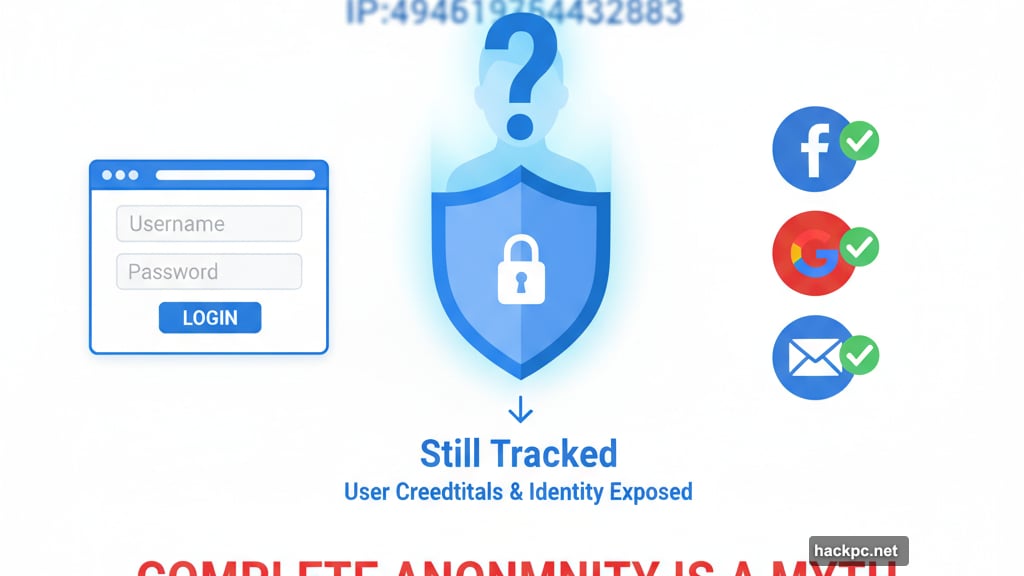
How to Read Influencer VPN Ads
Influencer VPN ads are usually paid deals, even if they sound like personal recommendations. Start by paying attention to who’s talking.
A film critic might focus on streaming access. A political host might emphasize privacy and surveillance. The message usually matches the audience if the influencer knows what they’re doing.
Check if the creator clearly says it’s a sponsored ad. If not, that’s a bad sign.
Then verify the claims yourself. Look at the VPN’s website and see if the features mentioned match what’s officially listed. If the ad makes promises that don’t appear in the company’s FAQ or official materials, trust the official source.
The ad is there to sell. Documentation is where the facts live.
What a VPN Will Not Do
A VPN helps with privacy, but not your entire online life. It hides your IP address and encrypts web traffic. That’s about where it stops.
Here’s what a VPN will not do:
Make you anonymous if you’re logged into accounts with your real name. Fix weak passwords or replace multifactor authentication. Stop phishing attempts or prevent you from visiting fake websites. Protect you from malware. Erase data that brokers and companies have already collected.
A VPN is one privacy tool, not a full cybersecurity defense. Real security still depends on you, how you use the internet and how careful you are with your information.
You Might Not Even Need One
I use a VPN every day because it fits my routine. I work on the move, connect to public Wi-Fi occasionally and prefer to keep my browsing relatively private.
For some people, it really depends on how they use the internet. If you’re often on public networks or don’t want your ISP logging your activity, a VPN can be useful.
But if you spend most of your time at home on a secure network, or if you’re buying one because a YouTuber said it makes you “completely safe,” then a VPN might not make much difference.
A VPN is a tool, not a promise. Use it for privacy and access, but not for security myths. Buy it for what it actually does, not for what the ads say it will do.
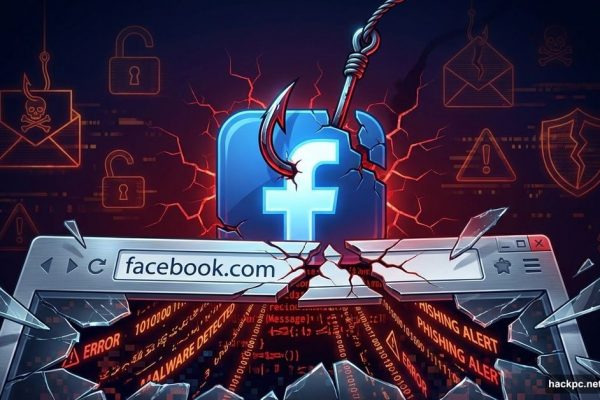
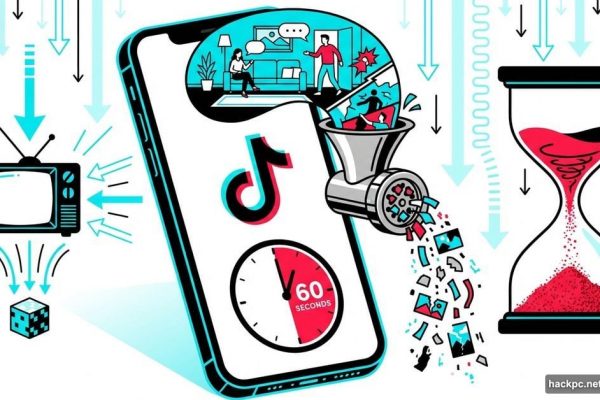
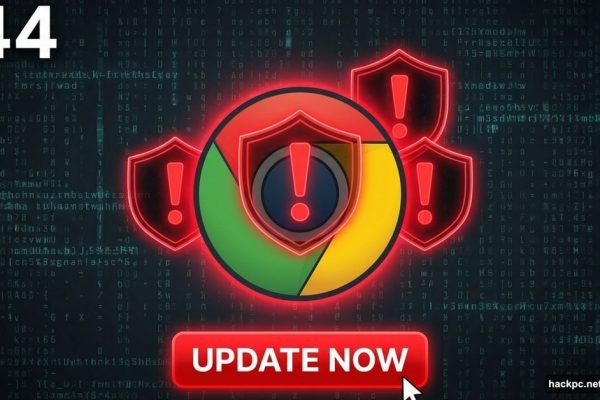
Comments (0)